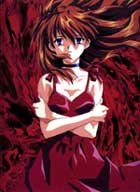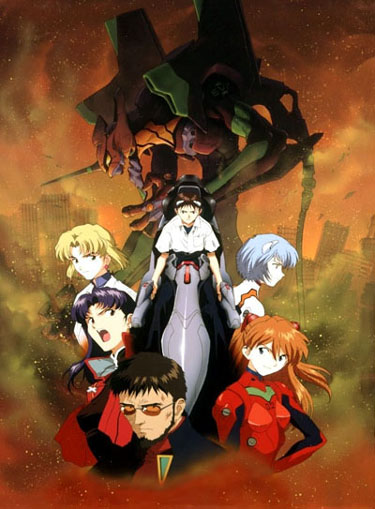![]()
Home
Table of Contents
The Fine Print
Shoujo Anime
Other
Anime
Shoujo
Manga
![]() Favorite
Episodes
Favorite
Episodes
Evangelion: Hmmm, probably episode 2, when Shinji was face-to-face with his first Angel and his Eva went dead, then reactivated and attacked the Angel as if there's no tomorrow. That's definitely kick-ass! ^_^ I can still remember Shinji's Eva dragging and smashing the Angel with one arm...
Death: Ummm, sorry. Nothing here. Unless you count the scenes shown from episode 2 when Shinji attacked his first Angel.
Rebirth: Definitely the one when Asuka attacked the nine second-generation Eva models. More kick-ass! ^_^
End of Evangelion: Ditto with Death.

 If
Sailor Moon was the ultimate shoujo anime in the late nineties, Neon Genesis
Evangelion was its shounen equivalent. I'm not into mecha, and there are
no hot bishies in it, but many shrines rhapsodize about it. So I went ahead
and tried to find out what the hype is all about...
If
Sailor Moon was the ultimate shoujo anime in the late nineties, Neon Genesis
Evangelion was its shounen equivalent. I'm not into mecha, and there are
no hot bishies in it, but many shrines rhapsodize about it. So I went ahead
and tried to find out what the hype is all about...Synopsis
It was the year 2015 AD, fifteen
years after half of the Earth's population was annihilated by what many
believed was a meteorite. The incident, termed The Second Impact, was
actually because of a bizaare and destructive life form called an "Angel."
Now a series of Angels appear fifteen years after the first one. The Angels
cannot be defeated by ordinary methods, not even nuclear bombs. In desperation,
UN enlisted the help of NERV, a secret organization dedicated to building
the weapons that can counter the Angels. These weapons are the Evangelions,
or Evas, which are huge mechas that can only be piloted by children born
nine months after The Second Impact.
Three14-year-olds are chosen to pilot the Evas. First is Rei Ayanami, who pilots the first Eva ever created (Prototype 00, colored blue). Then there's Shinji Ikari, the son of NERV's Commander Gendo Ikari, who pilots Prototype 01 (colored purple). Lastly is Asuka Langley Sohryu, who grew up in Germany, and who controls the Prototype 02 (colored red). Interestingly, the teens' behavior matches their Evas. Rei is the quiet one, who would always keep to herself, won't talk unless spoken to, and deeply infatuated with Commander Ikari. Asuka loves to take on a challenge, is not afraid to look at danger in the eye, and would have her occasional temper. Shinji, amusingly, is somewhere in between: would have spurts of bravado when goaded, but most of the time resenting his role as an Eva pilot. He would often be confused with his feelings towards Rei, who seem to find him invisible. He also became Asuka's unwilling verbal punching bag.
The other characters provide certain twists in the story. NERV's Commander Gendo Ikari, while treating Rei like a favorite, would consider his son unworthy of his time. Captain Misato Katsuragi, the pilots' mentor, is skilled in making snap decisions in life and death situations, but is incompetent when it comes to matters of the heart. Ritsuko Akagi, NERV's chief scientist whose mother created the MAGI (NERV's super computer), is in love with Commander Ikari and is in danger of committing the same mistake her mother had done. Kaji Ryoji, who brought Asuka's Eva from Germany to Japan, used to be Misato's ex and has suspicious dealings against NERV.
Most episodes of Neon Genesis Evangelion features an Angel of the day, with bits of information about their existence, the true nature of the Evas, and psychoanalytic profiles of each of the characters. It spans 26 episodes, with the 24th episode showing the defeat of the last Angel, which happens to be a newly appointed Eva pilot having a blossoming friendship with Shinji. Episodes 25 and 26 meanwhile features an examination of Shinji's mind and feelings.
The tv series is followed by Death and Rebirth. Death summarizes the first 24 episodes with lots of flashbacks and captions, while Rebirth is a follow-up of episode 24--or a retelling of episodes 25 and 26. Rebirth focuses on SEELE (a secret organization in charge of NERV) and its plan to dissolve NERV after the last Angel was killed by planting a virus into NERV's computer mainframe. When Gendo Ikari foiled them of their plan, SEELE sought to destroy the NERV facility and its personnel, including the Eva pilots. All three pilots however were spirited away from the SEELE gunmen, and so SEELE decided to take drastic measures: they released the new Eva series that don't require cables to attack the older Evas. Asuka took up the challenge by tackling all nine advanced Eva models using only her Eva's emergency power.
Neon Genesis Evangelion ultimately culminates with End of Evangelion, which consists of the commencement of The Third Impact through Shinji's Eva and the advanced Eva models, more psychoanalysis of the Eva pilots (particularly Shinji's), thought-provoking scenes about the existence of the Angels. And religion, with talk about Adam and Lillith and pictures of crucifixes that are constantly seen in the show.
 Review
Review
Neon Genesis Evangelion is kick
ass--the first 24 episodes of the tv series, anyway. So (*cracking knuckles*),
let's start with those:
Plotwise, it has the tried and tested story of alien invasion. Heck, there's lots of Hollywood movies and animes with that concept, so many of them it gets tiring to watch. But what makes Neon Genesis Evangelion special is its attention to detail. Ordinarily, movies and animes with giant mechas are powered by magic stones (think Vision of Escaflowne), rare minerals, limitless supply of electricity, or just plain magic. The Evas meawnhile are powered by cables that supply them massive electricity enough to put a whole country on blackout if necessary. And when they're not connected on cables, they only have a few minutes for them to run on emergency power before they become inactive (like a laptop computer). It's a small detail, but it struck me that it makes perfect sense to require huge energy to power giant mechas like the Evas. How believable is that?
Then there's the idea that it doesn't only involve senseless bashing of the Angels, but careful strategizing, which I don't always find in a mecha anime; the mechas usually punch and gun down the enemy mecha senseless and they become the victors after a few minutes of repetitive violence. Nope, the Evas, piloted by teenagers, have to try new things everytime they encounter an Angel, and that's no small feat. The pilots' mentor also happens to be a woman (Misato Katsuragi). Yay. Talk about empowering women ^_^
Character development in the tv series is more than acceptable. With fourteen-year-old pilots, it's understandable how Hideaki Anno had played their emotions to the hilt, from Shinji's resentment to Asuka's fiery temper to Rei's apathy. They're still children after all, and with their rampaging hormones, anyone would have expected them to shed tears when frustrated, or else act giddy when they are buoyed with the success of defeating an Angel. The supporting characters also make the plot more interesting: Misato Katsuragi and Kaji Ryoji bring relief to the serious theme of the story with their on again, off again romance, while Gendo Ikari plays a key role in the existence of the Evas.
Music is appropriate for the story, although the opening theme sounds far too hip and j-pop to match the seriousness of Neon Genesis Evangelion. The seiyuus are great! Shinji was done by Megumi Ogata (Sailor Uranus), Asuka by Megumi Hayashibara (Faye Valentine in Cowboy Bebop), and Misato Katsuragi by Kotono Mistuishi (none other than Sailor Moon herself). Artwork is average, although they could have used more imagination with the Angels; the Evas are more frightening to look at, and they're the good guys (depends on how you define "good").
Ahem, enough praise for the tv series. As I've said, the first 24 episodes are all fine and dandy, but the last two sucked in my opinion. It all happened in Shinji's head, all this stuff about his reason for living, his feelings for his father, his guilt for killing an Eva pilot (who happens to be the last Angel), etc, etc. It's fine in the beginning, but when it's devoted to two episodes (gee, that's almost an hour), it really gets tedious, especially for people like me who have no patience for philosophical suppositions.
As for Death, since it's just one giant flashback of the first 24 episodes, I couldn't help but suppress a yawn every now and then. I just can't find the rationale for showing scenes that I've already watched in the tv series. Or maybe I just wasn't the sort to appreciate artistically-presented anime, since that's how I see it. It seems Death tries to get away with merely screenshots and captions and makes it appear all artsy and unique. Unfortunately, I wasn't really impressed with it -_-
Rebirth is more of an improvement over Death. At least it has a solid plot. I think many people will agree with me that the best scene here is the one where Asuka confronted the nine brand new Eva models with barely a few minutes to spare. It was a welcome change after the tv series disintegrated to psychodrama in the last two episodes.
However, it fell back to psychodrama in the End of Evangelion. Sure, I should have been excited because The Third Impact is actually happening after all the fuss over The Second Impact. But Hideaki Anno threw in these crucifix figures and giant Reis that exploded to little Reis and life's philosophies as explained to Shinji...and once again I was suppressing my yawns and feeling my eyes water up from drowsiness. Sorry to the fans who actually like this kind of stuff, but I really am not the person who appreciates these things. Personally, either it doesn't work in a two-dimensional anime, or else it was overdone.
Okay, so that's my take on Neon Genesis Evangelion. It started out well enough, but somewhere down the line, it got complicated enough for people (like me) to lose interest, which is really too bad. Then again, this complication is actually the reason why people build shrines dedicated to Neon Genesis Evangelion, with attempts to explain all the psychodrama. I wouldn't be surprised if there's a cult following Neon Genesis Evangelion somewhere ^_^